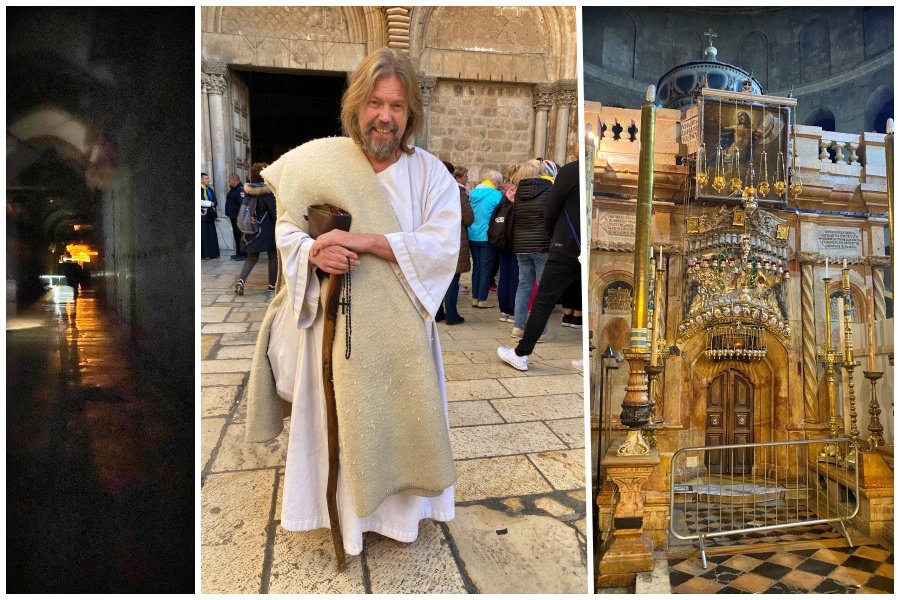
It was 4:30 am. I was at the gate of Damascus, along with the other pilgrims eager to walk the Stations of the Cross in Jerusalem. It was dark. We navigate through the narrow alleys, stopping at a spot marking a significant moment in the life of Jesus’ walk towards His crucifixion.
I could feel the silence of the early dawn. As we walked forward, vendors opened their shops, and workers cleaned the streets. There were road repair works in progress, forcing us to change routes or skip the usual way. It was a prayerful morning, singing hymns and reciting traditional prayers. We had to wind up our stations of the Cross before we entered the church.
Standing near the Church of Holy Sepulchre.
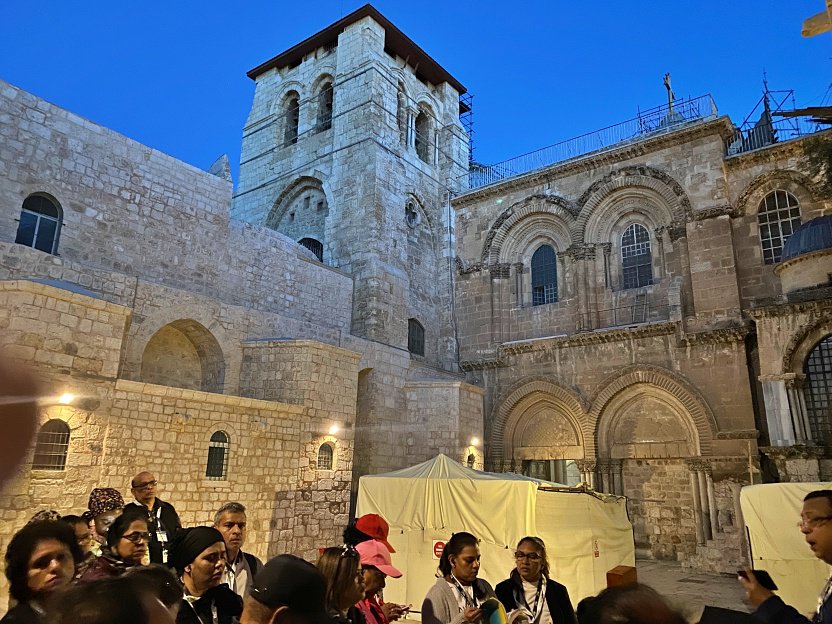
It was still not visible, but we gathered in one corner of the plaza in front of the Church of Holy Sepulchre. It was slowly beginning to brighten up. It was a sight one feels a prayer-filled silence simultaneously, a chatty noise – connected to the cacophony. It was the tourists, pilgrims, and locals – regular people who lived around the place or operated a business. It’s a place that offers many things to different sets of people.
The sacred space ownership is shared between ownership between Greek Orthodox, the Franciscan Order (Roman Catholic), the Armenian Church, and Coptic. It’s a sensitive space – rubrics for operation are well laid out. Disregarding it can erupt into tension, often resulting in a scene on the holy ground. Nevertheless, it is the site of Jesus’s crucifixion and burial. It recalls the Cross and the Empty Tomb for a follower of Jesus.
At the foot of the Cross
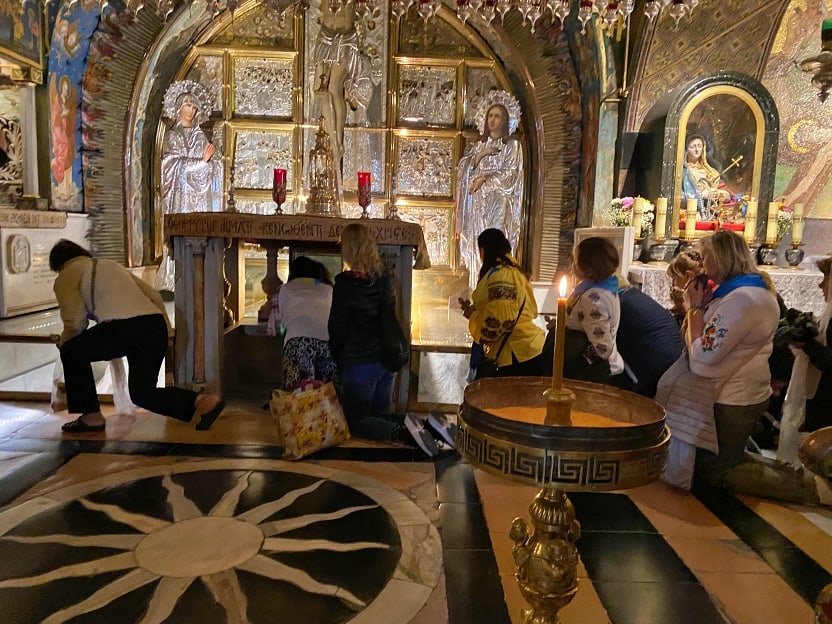
It was intense. But we were early and got easy access with minimal wait time. I witnessed pilgrims kneeling and moving towards the sacred area. Pilgrims have varied expressions of sanctity. One cannot judge the other – who is touching the forehead on the spot or just a respectful bow. Some genuflect and touch the crucifixion spot, and a few click a selfie. Although photography is restricted, people take their chance – after all, it’s a once-in-a-lifetime opportunity – they have their rationale.
I stood there watching pilgrims move into a caved space with oil chandeliers. I offered nudges to see the other important things in the area or maybe click a picture of our group members. I was interested in registering the scene as a spiritual experience – what I see, feel, touch, hear and beyond. I decided not to click a picture in the area. Now I don’t have one; as I swiftly scanned phone photos, I confirmed it. I do recall the area vividly with an experience.
What would you do if you found yourself at the foot of the Cross? Or if you were there, what did you do? You know my answer: nothing. That place is perfect! It doesn’t need you to do something or anything, just be there and soak in the sacred ambience. It is better to be inspired than copy (repeat) what others do.
Incredible Mass at the Empty Tomb
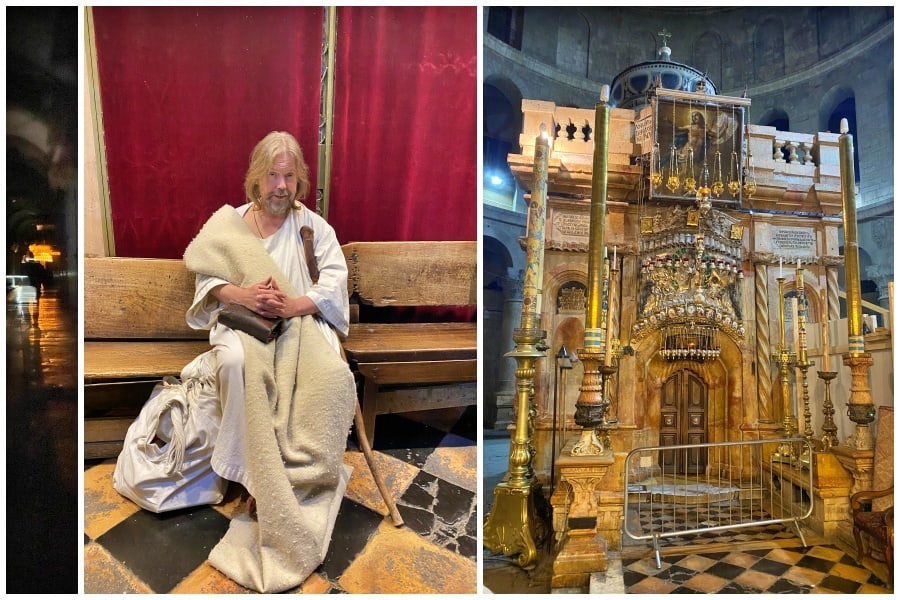
A rare occurrence. I don’t know how it happened. Thanks to our tour operators. They booked an early morning mass at 6:30 am at the basilica of Holy Sepulchre. It was the first mass of the day. Although the mass was in Latin, it was exclusively for our group. Some passer-by pilgrims did join, along with a few residents. The Franciscan choir sang during the mass.
The main celebrant, an American priest, was kind enough to allow the liturgy of the word in English. I don’t know Latin, and it was my first mass in the language. The unplanned assignment! I was told to deliver the sermon a few minutes before the mass began. The restriction came pounding, the mass must get over in 20 minutes, and you have two minutes for the sermon. The other rite would come to prepare for their service after the Catholic mass.
Click the link to listen. Thanks to the one who recorded and shared it with me.
I did have a choice to say, “I cannot do it on the spot.” But I learnt for a friend to say: I am born prepared. I did talk it up and zoomed my mind for mental preparation. Inspiration came overflowing. I decided to utter three sentences and a fourth as a summary statement.
I was inside the tomb for the remaining part of the mass—just three of us, the main celebrant and the other celebrant. The mass was in Latin, and the Eucharist prayer was sung; I turned the page before one para. But the priest managed to complete it without getting upset with me.
In conversation with look-alike Jesus
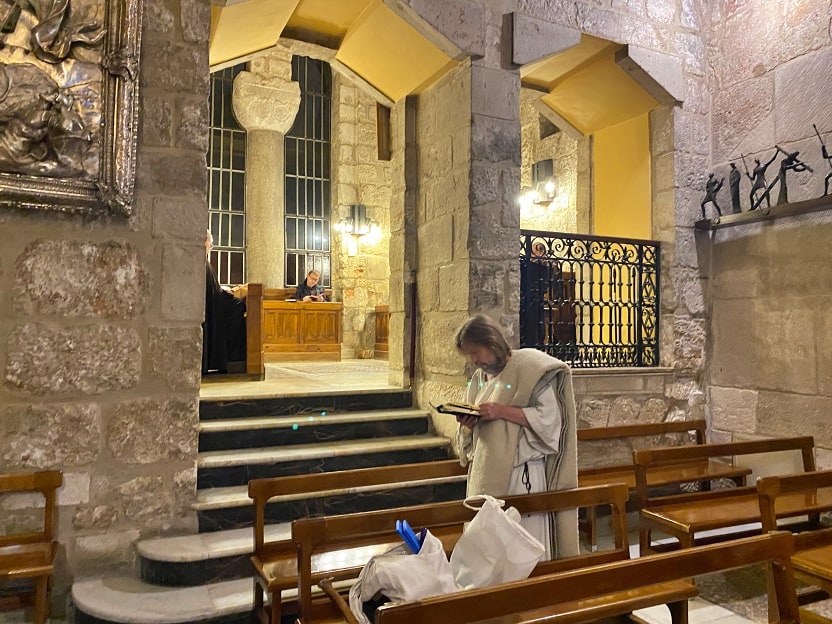
You cannot miss him. He walks at a leisurely pace with a smiling face. He is a known figure to the local guides and residents of the Holy Land. But for the new pilgrims, he is Jesus – walking in Jerusalem. He arrived around the time of the first mass. I saw him joining in for lauds – office of reading in the private chapel. It was a short time. HE appears and disappears. Then he sat in front of the tomb. I went and sat alongside him after mass.
“This is not a costume; it’s a lifestyle,” he says, anticipating my curiosity. I nod in affirmation. But he repeated to make sure I got it correctly. As a journalist, I have questions ready to fire. It’s a feature or a scoop. And so, I started. Later I discovered his name, James. He has lived trusting in the providence of God for the past 14 years – without possessions. What he had on in the haversack, that’s it.
I tried to slip in few British pounds into his prayer book. He refused. He said, “I don’t touch money.” I was in shock. He kindly requested that I take it back from the book. More questions I had in mind. “How do you manage?” I asked. He answered with a smile, “Trust in the providence.”
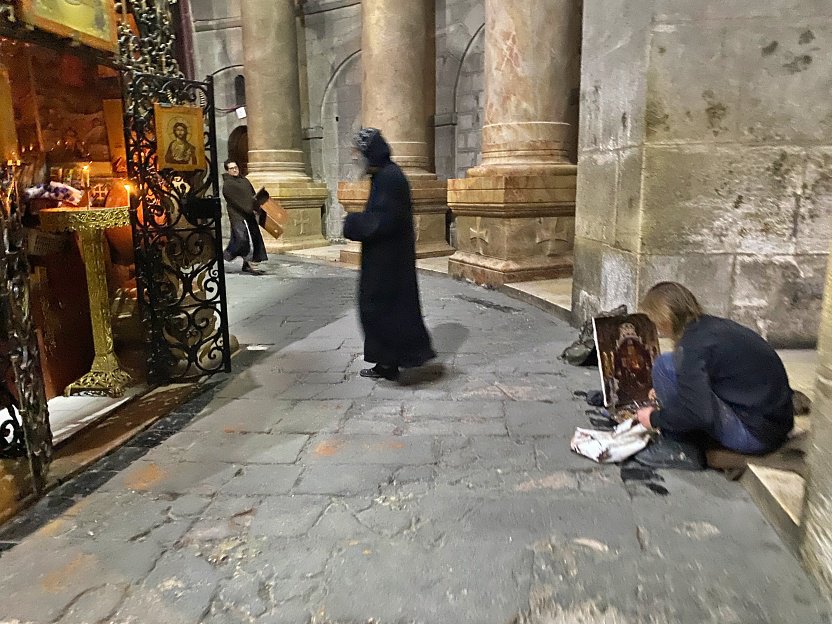
James lives in the holy land as an itinerant pilgrim. He says, “The whole world comes to this place.” Earlier, he lived in different parts of the world, including India. He was in Chennai for a few months and claimed that he visited the body of St. Francis Xavier in Goa on the Western coast of India.
I asked, “How do you travel without money?” His simple answer was that “it happens. God makes it possible.” In the brief 20 minutes, we could talk about world politics, economics, and religion. He did point out the Cross I wear. “It is the St. Benedict cross,” he said. “Among all the medals, it is regarded as the medal of highest spiritual value.” I did know that it was a cross used for exorcism.
Final words on the unexpected.
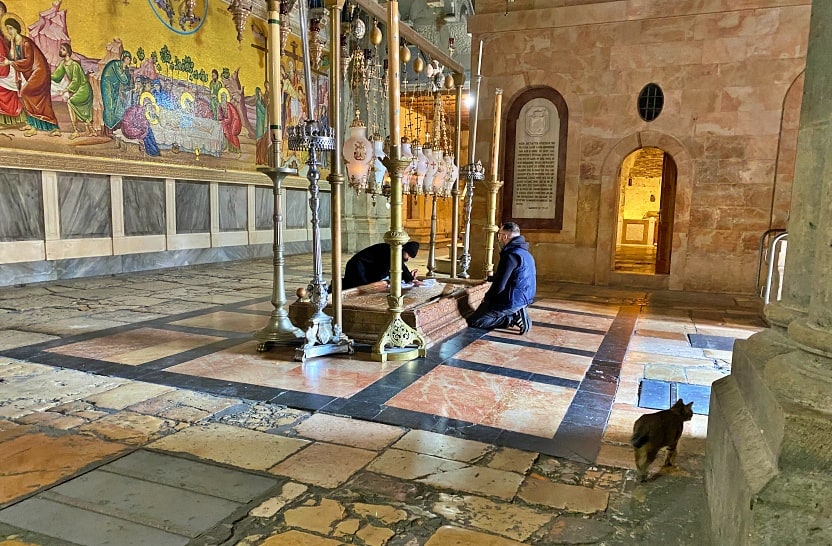
The unexpected always happens when you let the God of surprises work in mysterious ways. People plan in detail and allow God little space to operate. Sometimes I feel people make it difficult as they are like horses with blinkers and cannot see beyond the horizon.
About the Author
Feroz Fernandes, a Catholic Missionary, identifies himself as an Uncommon Priest. Father Feroz loves adventure in the apostolate. Check out his debut book The Uncommon Priest: Incredible Stories You Never Read on amazon. And also, the YouTube Channel: Feroz Fernandes promotes a better understanding of scripture.
Well written. Gave something to reflect upon. Thank you.
It was a spiritual experience – one of its kind!
Lovely article Father….
Glad you like it. Share it with your friends! Hope all get an opportunity to go on a pilgrimage.